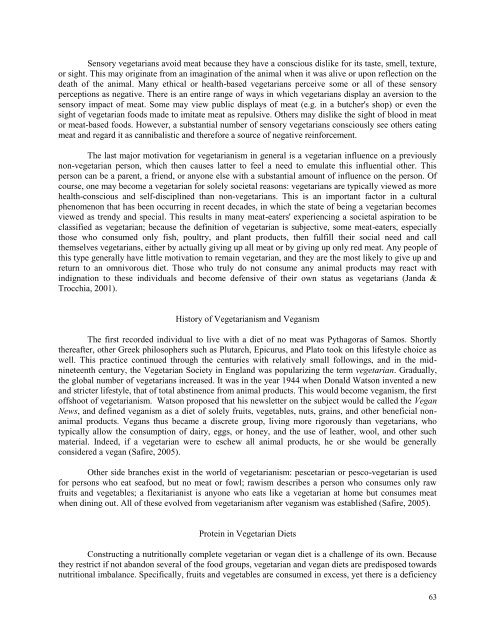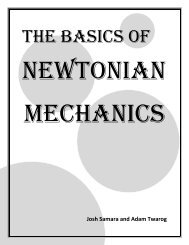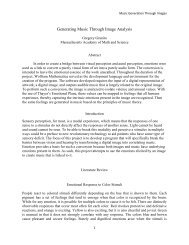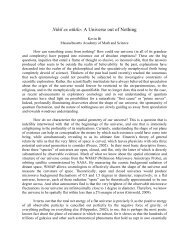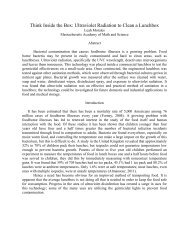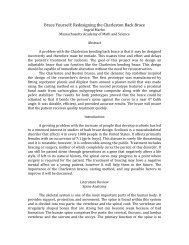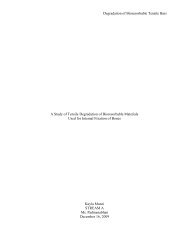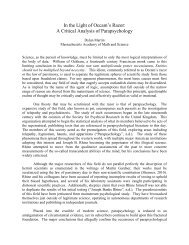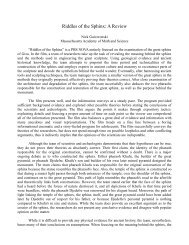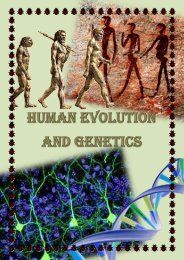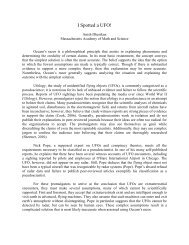Got Food? - the Scientia Review
Got Food? - the Scientia Review
Got Food? - the Scientia Review
You also want an ePaper? Increase the reach of your titles
YUMPU automatically turns print PDFs into web optimized ePapers that Google loves.
Sensory vegetarians avoid meat because <strong>the</strong>y have a conscious dislike for its taste, smell, texture,<br />
or sight. This may originate from an imagination of <strong>the</strong> animal when it was alive or upon reflection on <strong>the</strong><br />
death of <strong>the</strong> animal. Many ethical or health-based vegetarians perceive some or all of <strong>the</strong>se sensory<br />
perceptions as negative. There is an entire range of ways in which vegetarians display an aversion to <strong>the</strong><br />
sensory impact of meat. Some may view public displays of meat (e.g. in a butcher's shop) or even <strong>the</strong><br />
sight of vegetarian foods made to imitate meat as repulsive. O<strong>the</strong>rs may dislike <strong>the</strong> sight of blood in meat<br />
or meat-based foods. However, a substantial number of sensory vegetarians consciously see o<strong>the</strong>rs eating<br />
meat and regard it as cannibalistic and <strong>the</strong>refore a source of negative reinforcement.<br />
The last major motivation for vegetarianism in general is a vegetarian influence on a previously<br />
non-vegetarian person, which <strong>the</strong>n causes latter to feel a need to emulate this influential o<strong>the</strong>r. This<br />
person can be a parent, a friend, or anyone else with a substantial amount of influence on <strong>the</strong> person. Of<br />
course, one may become a vegetarian for solely societal reasons: vegetarians are typically viewed as more<br />
health-conscious and self-disciplined than non-vegetarians. This is an important factor in a cultural<br />
phenomenon that has been occurring in recent decades, in which <strong>the</strong> state of being a vegetarian becomes<br />
viewed as trendy and special. This results in many meat-eaters' experiencing a societal aspiration to be<br />
classified as vegetarian; because <strong>the</strong> definition of vegetarian is subjective, some meat-eaters, especially<br />
those who consumed only fish, poultry, and plant products, <strong>the</strong>n fulfill <strong>the</strong>ir social need and call<br />
<strong>the</strong>mselves vegetarians, ei<strong>the</strong>r by actually giving up all meat or by giving up only red meat. Any people of<br />
this type generally have little motivation to remain vegetarian, and <strong>the</strong>y are <strong>the</strong> most likely to give up and<br />
return to an omnivorous diet. Those who truly do not consume any animal products may react with<br />
indignation to <strong>the</strong>se individuals and become defensive of <strong>the</strong>ir own status as vegetarians (Janda &<br />
Trocchia, 2001).<br />
History of Vegetarianism and Veganism<br />
The first recorded individual to live with a diet of no meat was Pythagoras of Samos. Shortly<br />
<strong>the</strong>reafter, o<strong>the</strong>r Greek philosophers such as Plutarch, Epicurus, and Plato took on this lifestyle choice as<br />
well. This practice continued through <strong>the</strong> centuries with relatively small followings, and in <strong>the</strong> midnineteenth<br />
century, <strong>the</strong> Vegetarian Society in England was popularizing <strong>the</strong> term vegetarian. Gradually,<br />
<strong>the</strong> global number of vegetarians increased. It was in <strong>the</strong> year 1944 when Donald Watson invented a new<br />
and stricter lifestyle, that of total abstinence from animal products. This would become veganism, <strong>the</strong> first<br />
offshoot of vegetarianism. Watson proposed that his newsletter on <strong>the</strong> subject would be called <strong>the</strong> Vegan<br />
News, and defined veganism as a diet of solely fruits, vegetables, nuts, grains, and o<strong>the</strong>r beneficial nonanimal<br />
products. Vegans thus became a discrete group, living more rigorously than vegetarians, who<br />
typically allow <strong>the</strong> consumption of dairy, eggs, or honey, and <strong>the</strong> use of lea<strong>the</strong>r, wool, and o<strong>the</strong>r such<br />
material. Indeed, if a vegetarian were to eschew all animal products, he or she would be generally<br />
considered a vegan (Safire, 2005).<br />
O<strong>the</strong>r side branches exist in <strong>the</strong> world of vegetarianism: pescetarian or pesco-vegetarian is used<br />
for persons who eat seafood, but no meat or fowl; rawism describes a person who consumes only raw<br />
fruits and vegetables; a flexitarianist is anyone who eats like a vegetarian at home but consumes meat<br />
when dining out. All of <strong>the</strong>se evolved from vegetarianism after veganism was established (Safire, 2005).<br />
Protein in Vegetarian Diets<br />
Constructing a nutritionally complete vegetarian or vegan diet is a challenge of its own. Because<br />
<strong>the</strong>y restrict if not abandon several of <strong>the</strong> food groups, vegetarian and vegan diets are predisposed towards<br />
nutritional imbalance. Specifically, fruits and vegetables are consumed in excess, yet <strong>the</strong>re is a deficiency<br />
63


